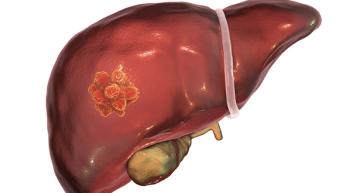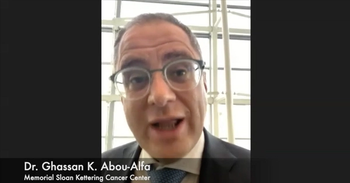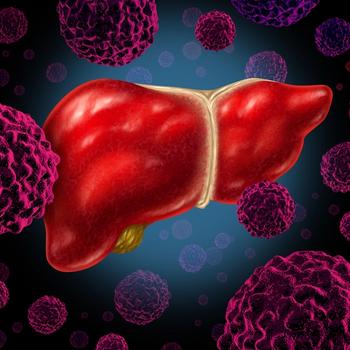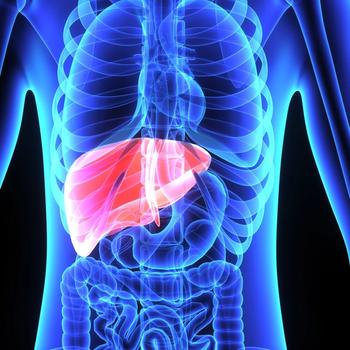
Liver Cancer
Latest News

Latest Videos

More News

Treatment with Cabometyx in combination with Tecentriq induced superior progression-free survival outcomes and disease control rates versus Nexavar alone in patients with advanced hepatocellular carcinoma, the most common type of liver cancer.

From “General Hospital” star Cameron Mathison discussing his cancer experience to Dame Deborah James and Hells Angels founder Sonny Barger dying of the disease, here’s what happened in the cancer space this week.

Treatment with an experimental drug delivered through a minimally invasive procedure may show promise in patients with liver cancer that cannot be treated with surgery.

Although she has always been driven to excel, Karen Driskill's, M.S., RN, purpose became more focused after her mother-in-law passed away from intrahepatic cholangiocarcinoma in 2010.

The priority review means that the FDA plans to speed up its review of Imfinzi combined with chemotherapy in patients with advanced or metastatic biliary tract cancer.

From liver cancer survivor planning to run the upcoming Boston Marathon with his organ donor to a common HIV drug showing promise in treating colorectal cancer, here’s what’s happening in the cancer space this week.

“Combination therapy with (Opdivo) plus (Yervoy) warrants further studies in the preoperative setting for patients with resectable hepatocellular carcinoma, which could transform the role of immunotherapy from palliative treatment in the metastatic setting to curative treatment in localized disease,” the study authors wrote.

The FDA plans to decide on whether to approve futibatinib for the treatment of patients with previously treated, locally advanced or metastatic cholangiocarcinoma that harbors a certain genetic mutation by September.

From Pfizer issuing a voluntary recall of three blood pressure drugs due to a high level of a cancer-causing chemical to “Today Show” co-ancho Hoda Kotb discussing her struggles with fertility after receiving a diagnosis of breast cancer, here’s what’s happening in the cancer space this week.

The combination of Cabometyx and Tecentriq failed to improve overall survival in patients with advanced hepatocellular carcinoma, the most common type of primary liver cancer, compared with single-agent Tecentriq or Nexavar.

Despite several FDA drug approvals over the past few years in the cholangiocarcinoma space, many patients are ineligible for these treatments as a first option, signaling a significant unmet need.

Treatment with a combination of PD-1 inhibition, minimally invasive chemotherapy and Lenvima improved outcomes for patients with unresectable liver cancer compared to PD-1 inhibition and Lenvima alone.

A woman whose husband died from cancer explains how she shattered a piece of pottery and glued it back together, to represent the cracks of her life left by her loss and how her husband remains connected to her.

An expert from Memorial Sloan Kettering Cancer Center in New York discusses the promising findings from a study that analyzed tremelimumab plus Imfinzi for unresectable hepatocellular carcinoma, and outlines side effects patients should discuss with their doctor.

Patients with biliary tract cancer achieved a better survival outcome after receiving treatment with an oral antimetabolite following surgical resection than patients who only were treated with surgery.

The use of a non-invasive procedure combined with Lenvima plus Tyvyt demonstrated safe and effective results in patients with liver cancer not eligible for surgical resection.

Researchers observed this benefit in recurrent HCC after liver transplantation, which represents a patient population often excluded from clinical trials due to potential organ rejection.

Treating patients with liver cancer initially with Lenvima instead of the standard of care was associated with a survival benefit, according to recent research.

The use of a minimally invasive procedure — known as trans-arterial chemoembolization — plus Lenvima and a PD-1 checkpoint blockade drug proved to be safe and efficacious in patients with unresectable advanced liver cancer.

The use of immunotherapy in patients with advanced cancers and decreased fitness levels or organ function increased from 2014 to 2019, although trials for this treatment typically exclude this population.

CURE® took a look back at our most-read liver cancer stories from this year.

External-beam radiation, a noninvasive option for bridging therapy, may be underused compared with other liver-directed therapies and may highlight a treatment gap in this area.

Cholangiocarcinoma Foundation volunteer Lourdes Rocha leads the Veterans Program and shares her experience filing claims with the VA in a recorded webinar.

Patients who experience side effects due to immune checkpoint inhibitors are 80% more likely to go to the emergency room and have 30% higher monthly medical costs, compared to patients who did not have side effects.

Data from a phase 3 trial show that frontline tremelimumab plus Imfinzi improved overall survival in patients with liver cancer.













